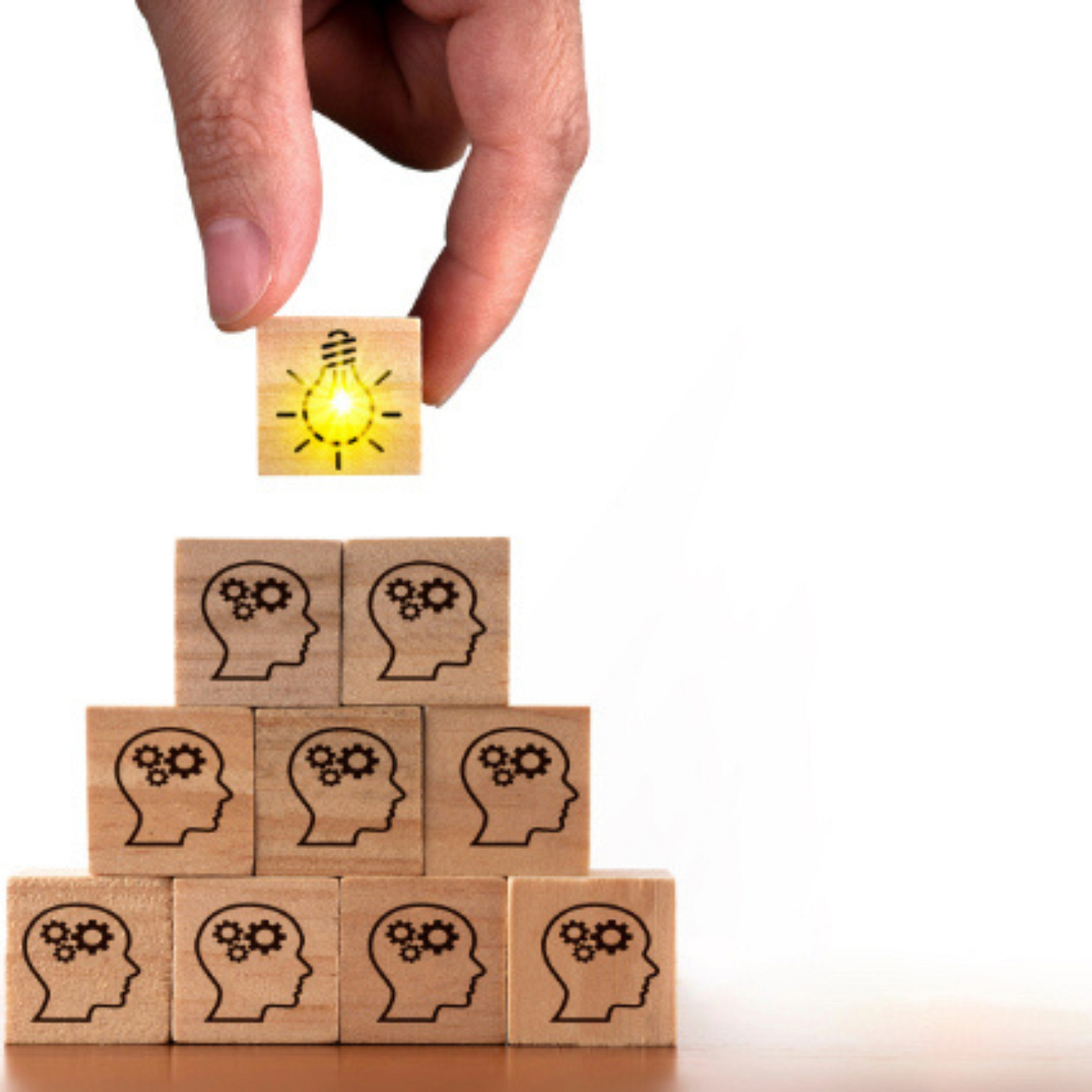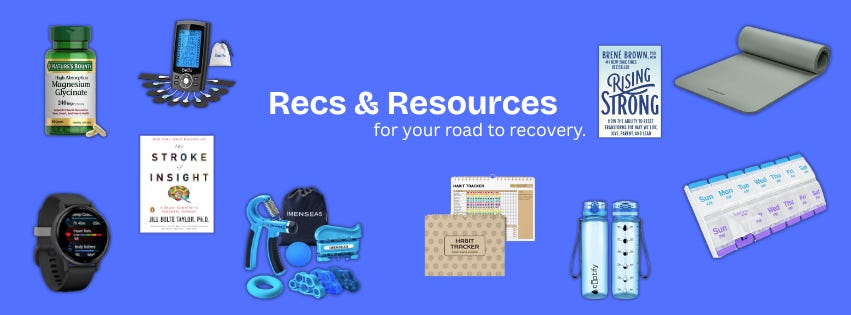Resources for the Road to Recovery
A curated list of tools, tips, and communities for life after brain injury.
Before we dive in, don’t forget to subscribe if you haven’t already. This way, you’ll always stay up to date with our latest tips, tools, and resources.
The Road to Recovery & all the Resources Along the Way
In the beginning, it was a lot. No one hands you a guide when this stuff happens. Suddenly there’s a bunch of medical terms you’ve never heard, decisions you don’t feel ready to make, and a timeline that doesn’t make sense. Half the time it felt like just trying to get through the day and Googling whatever came up next (wouldn’t recommend).
A few helpful links were shared in the first newsletter, but here’s a more complete list of what’s actually been useful, or would’ve been, if someone had handed over a guide at the start. Some of these are medical and support-focused, especially helpful early in recovery. Others lean more lifestyle - things that made day-to-day life feel just a little more normal again.
Whether you’re in recovery or helping someone who is, hopefully something here helps make the next step feel a bit clearer. Or at the very least, a little less alone.
Professional & Practical Support
The early days of recovery can feel like information overload. This section includes trusted medical, mental health, and caregiving resources, as well as financial tools, to help you navigate the serious stuff with a little more clarity.
Medical & Rehabilitation Guidance
American Stroke Association – Their Life After Stroke section covers a ton: what to expect after leaving the hospital, how to handle everyday challenges, tips for rehab, and emotional recovery. It’s one of the most comprehensive resources we came across.
Brain Injury Association of America (BIAA) – Tons of useful info here for both survivors and caregivers. Their education section is especially good if you want to understand more about brain injury or stay up to speed on what’s out there, whether you're new to this or a few months (or years) in.
Finding the right doctors – You’ll probably be handed a list of follow-ups after the hospital, but if you’re not - or even if you are - it never hurts to get a second opinion or explore your options. Tools like Zocdoc or your insurance provider’s directory can help you find specialists like neurologists, speech-language pathologists, occupational therapists, and more.
Home adjustments - Look into AARP’s home fit guide or consult an OT to make everyday spaces safer and more functional.
Therapy & Mental Health Support
Psychology Today’s Therapist Finder – Filter by specialty, insurance, and modality (trauma, grief, CBT, etc.).
BetterHelp or Talkspace - Both are online therapy platforms that make it easier to access licensed professionals without needing to leave home—huge when mobility or energy is limited. BetterHelp generally has stronger reviews for ongoing therapy relationships, while Talkspace can be a bit more structured. Ideal for survivors or caregivers needing consistent emotional support.
Open Path Collective – Offers low-cost therapy for individuals and couples.
Support Groups – Search for stroke/TBI support groups through Facebook, local hospitals, or national organizations like BIAA. Connecting with others who "get it" can be a lifeline.
Caregiver Resources
Caregiver Action Network – Offers support, education, and connection for those caring for loved ones.
Respite services - Look into local programs that provide short-term care so you can rest.
Therapy for caregivers - Your mental health matters too (see above for recs). Therapy helps you show up better for both yourself and the person your caring for.
Financial support resources
National Stroke Association and Brain Injury Association of America - sometimes offer emergency grants or guidance on financial relief programs.
Patient Advocate Foundation - helps with medical debt and navigating healthcare costs.
Modest Needs - a nonprofit that offers small emergency grants to people in short-term financial crisis, including medical situations. These can be game-changers for families managing sudden expenses, reduced income, or long rehab timelines.
Daily Living Recommendations
These are the tools, routines, and stories that support everyday life. From helpful apps to wellness tips and motivating reads, this section is all about what makes life feel a little easier, lighter, and more you again. We’ll also be sharing a full Amazon guide soon with some of the tools and products that made day-to-day a little easier, but until then, here are a few resources to check out:
Everyday Aids
Apps for brain training - Try Elevate, Lumosity, or BrainHQ for cognitive rehab support.
Assistive tools - Consider speech-to-text apps, pill organizers, or other adaptive utensils to support independence. Here are a few that stood out to me:
Stress balls + grip strengtheners - These small tools are simple but effective for rebuilding hand and forearm strength, improving circulation, and calming anxiety. Great for people working on mobility, coordination, or just needing a sensory release.
At-home exercise gear - Lightweight resistance bands, balance pads, and seated pedal bikes can help make movement accessible at all levels. Perfect for when in-person PT isn’t an option or to stay active between sessions. When I was first starting out, I didn’t have any fancy equipment- my family just bought me a cheap kid-sized rubber basketball and I practiced throwing it over and over. It was simple, affordable, and it worked. You don’t need to spend a ton of money to rebuild strength and coordination. Consistency matters more than gear.
Muscle stimulator (TENS/EMS unit) - I used a muscle stimulator to help re-engage muscles and support nerve pathways during early recovery. It can be especially helpful in regaining movement in limbs that feel disconnected or underused (always check with a doctor or PT before starting.)
Stories & Community
🚨 Trigger warning: While communities & other people’s stories can be incredibly validating and informative, they sometimes include graphic or emotionally heavy posts without warnings. If you're dealing with health anxiety or are easily triggered (that’s me), it’s okay to opt out or take breaks. It’s important to protect your mental space—scroll carefully, and only when you’re ready.
Podcasts:
Stroke Stories – Real recovery journeys, told by survivors.
The NeuroNerds – Honest and sometimes hilarious conversations around life with brain injury.
Social media & blogs - Many survivors and caregivers share their stories online - follow, connect, and don’t be afraid to reach out. Since partnering with the American Heart Association, so many people have reached out to share their own experiences or ask questions. I’ve always been grateful for those conversations and I’m more than happy to pay it forward. Connection really does make a difference (@jesseshea01 or @alexshea23 if you want to reach out to either of us on instagram)
Reddit - Subreddits like r/stroke and r/TBI can be surprisingly helpful and kind.
Discord Community: - stay tuned - our Discord community is coming soon!
Books Worth Reading
We’ll be doing a full post soon with more recommendations - covering stroke-specific books, motivational reads, books that help you escape, and everything in between. Until then, here’s a few to get you started:
My Stroke of Insight by Jill Bolte Taylor – A neuroscientist's account of her own stroke and recovery.
To Root & To Rise by Carole Starr – Written by a TBI survivor, this combines memoir and practical healing exercises. It’s gentle, validating, and empowering—especially helpful in the long, quiet middle of recovery.
Rising Strong by Brené Brown – A look at how we bounce back after struggle.
Relentless by Tim Grover – About what it takes to stay driven, especially when the odds are stacked.
Health & Wellness Support
Challenged Athletes Foundation – Getting back into health and wellness was a big part of my journey. CAF offers grants and support to individuals with physical challenges who want to stay active, play sports, or reconnect with movement. Whether you're a former athlete or just trying to get back on your feet, it's worth checking out.
Nutrition for Recovery - Fueling your body during recovery isn’t just about calories—it’s about healing. I have a degree in Nutritional Science and one thing that’s worked wonders is following an anti-inflammatory diet. Foods rich in omega-3s, leafy greens, healthy fats, and whole grains can support brain health and reduce inflammation. Apps like MyFitnessPal or Cronometer can help track nutrients and spot gaps. Not sure where to start? A Mediterranean-style approach is a great foundation - or consider talking to a nutritionist familiar with neurological recovery (fun fact: nutritionists are usually covered by your insurance).
Sleep & Brain Health - Recovery needs rest. Tools like the Oura Ring and Garmin make it easy to track sleep patterns and energy. Struggling with sleep? You’re not alone. We’ll be sharing tips soon on what’s helped—and what hasn’t.
Adaptive Yoga & Mindful Movement - Gentle movement can improve balance, coordination, and anxiety. Check out LoveYourBrain Yoga—a free, adaptive program for TBI survivors and caregivers—or search YouTube for beginner-friendly yoga or tai chi designed for limited mobility.
Hydration Reminder Tools - Simple but effective—apps like Plant Nanny or WaterMinder can help you stay on top of hydration, which is crucial for brain health, mood, and energy. You could also use a water bottle with time markers, so you know exactly how much you should have drunk by different points throughout the day.
Supplements Worth Exploring (talk to your doctor first!) - Some people in recovery explore supplements like magnesium glycinate, omega-3s, vitamin D, or Lion’s Mane mushroom for cognitive support. Everyone’s recovery is different, so definitely consult your care team—but we’ll be sharing what’s helped us and what to watch out for.
Thanks for reading! We hope you found something helpful today. If you know someone who could benefit from these resources, please share this newsletter with them. We’re all in this together—let’s keep supporting each other. Until next time!



